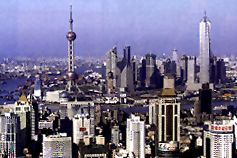|
Week of March 24, 2003 Snapshot from the Field |
|
LOOKING FOR A PREVIOUS STORY? CHECK THE ARCHIVE.
Timken's Shanghai Expansions Belie Seeming Business Isolationism
by JACK LYNE, Site Selection Executive Editor of Interactive Publishing
SHANGHAI – With war's deepening toll and thunder dominating world headlines, isolationism may seem the business order of the day. The media's understandable Middle Eastern focus, however, obscures a quietly ongoing corporate globalization.
Case in point: Canton, Ohio-based Timken Company (www.timken.com). The bearings and alloy steel manufacturer recently opened a new distribution center in Shanghai (www.shanghai.gov.cn). And that new operation complements the company's already expanding Chinese manufacturing and sales presence, as Timken capitalizes on the Asian market. "This distribution company is one of several initiatives The Timken Company is pursuing in China," explained Gordon Robinson, the company's president of emerging markets. "It is a logical next step in the company's evolution in Asia. Our goal is to provide a more efficient import and export mechanism to facilitate sales growth."
Located in Shanghai's Waigaoqiao Free Trade Area, the new center for Timken Engineered Products Shanghai Co. Ltd. is handling a wide range of industrial bearings and related components, primarily for the power transmission market. The operation has begun distributing Timken products, as well as those of other manufacturers, into China - a supremely ripe market for power transmission. Timken chose a site located in the northeast corner of the Pudong New Area (http://pudong.shanghaichina.org), located some 13 miles (21 kilometers) from Shanghai's downtown center. With its industrial output increasing by almost 20 percent in 2002, the Pudong New Area has been an economic stalwart for Shanghai, China's emerging business center. Some 1,800 companies from 44 separate nations have set up area facilities. Timken will join a long list of other major U.S.-based firms that have located in Pudong. Those American companies include Allied Signal, Bristol-Myers Squibb, Delphi Automotive Systems, Dupont, Ford, General Motors, Hewlett-Packard, IBM, Intel, Johnson & Johnson, Merrill Lynch, Motorola and Whirlpool.
Locating in the 2,500-acre (1,000-hectare) Waigaoqiao Free Trade Area further boosts Timken's globalization drive. Non-Chinese companies that locate in the area can establish trade companies as independent legal entities, obtain licenses for import and export trade, and act as trade agents. Distribution Center Complements Timken's Then, last year, Timken formed a joint venture with NSK Ltd. to build a bearings plant in the Shanghai area. Ground for the plant was broken in December 2002, with production projected to begin in first-quarter 2004. Timken actually entered the Chinese manufacturing sector seven years earlier. In 1996, the company formed a joint venture, Yantai Timken Company Ltd., to produce bearings in Yantai, a city of 1.5 million residents in eastern Shandong Peninsula on the coast of the Bohai and Yellow seas. Yantai Timken in 2001 became a wholly owned Timken subsidiary. The Yantai plant, which makes bearings for automotive and industrial applications, also continues to expand. By mid-2004 the production operation will enlarge its capacity to 5 million bearing sets per year. "Strategic export and import operations maximize the value of our production in the region," Vivian Ling, Timken's manager of distribution management and new business development in China, said of the company's newest operation in Waigaoqiao Free Trade Area. "This distribution center will help us facilitate manufacturing growth by speeding products to market both in China and globally." The new Shanghai facility will also offer customer service functions, Ling added. Manufacturing Shift Bad News for UK Plant The Shanghai distribution operation is the latest step in a major strategic shift Timken initiated three years ago to make its plants more cost-competitive. The new manufacturing strategy will reduce costs by US$120 million a year by the end of 2004, the company is projecting.However, as is usually the case in such shifts, that change has translated into different shades of news in different areas. In Darlington, England, for example, Timken's change has made for bad news. The company on March 20 announced that it was closing down the plant first opened in Darlington in 1964. The facility will be phased out over the next eight to 12 months, company officials said. The Darlington plant currently employs 104 workers. Timken had twice earlier reduced the work force, trying to make the plant-cost effective. But the cuts didn't work, company officials explained. "We have challenged all of the plants in our manufacturing network to achieve lowest total costs in their product lines," Michael Hill, vice president of manufacturing for Timken's Industrial Group, said in announcing the phase-out. "In early 2000, we began a process to transform The Timken Company. A fundamental goal of the transformation . . . is to make The Timken Company more profitable, more customer-centric and better able to grow. For that to happen, each plant must be competitive globally in the products that it manufactures. We'll continue to monitor the progress of our plants toward meeting this goal. "Darlington has been an important part of the company for nearly four decades," Hill continued. "The decision to close it did not come easily and only after careful study. We very much regret the impact this action will have on the lives of our associates who work at Darlington."
©2003 Conway Data, Inc. All rights reserved. Data is from many sources and is not warranted to be accurate or current.
|


